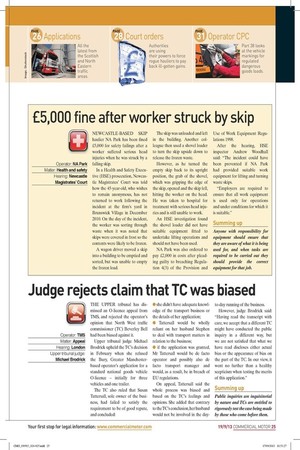Judge rejects claim that TC was biased
Page 19

If you've noticed an error in this article please click here to report it so we can fix it.
THE UPPER tribunal has dismissed an 0-licence appeal from TMS, and rejected the operator's opinion that North West traffic commissioner (TC) Beverley Bell had been biased against it.
Upper tribunal judge Michael Brodrick upheld the TC's decision in February when she refused the Bury, Greater Manchesterbased operator's application for a standard national goods vehicle 0-licence — initially for three vehicles and one trailer. The TC also ruled that Susan Tattersall, sole owner of the business, had failed to satisfy the requirement to be of good repute, and concluded: she didn't have adequate knowledge of the transport business or the details of her application; • Tattersall would be wholly reliant on her husband Stephen to deal with transport matters in relation to the business;
• if the application was granted, Mr Tattersall would be de facto operator and possibly also de facto transport manager and would, as a result, be in breach of EU regulations. On appeal, Tattersall said the whole process was biased and based on the TC's feelings and opinions. She added that contrary to the TC's conclusion, her husband would not be involved in the day
to-day running of the business.
However, judge Brodrick said: "Having read the transcript with care, we accept that a different TC might have conducted the public inquiry in a different way, but we are not satisfied that what we have read discloses either actual bias or the appearance of bias on the part of the TC. In our view, it went no further than a healthy scepticism when testing the merits of this application."
Summing up
Public inquiries are inquisitorial by nature and TCs are entitled to rigorously test the case being made by those who come before them.







































